The method getNextAvailableVm() allots virtual machines for a particular data center in a round-robin fashion. (The integer returned by this method is the machine allotted)
In a data center there could be virtual machines with different set of configurations. For example :
5 VMs with 1024 memory
4 VMs with 512 memory
Total : 9 VMs
For this data center a machine with 1024 memory will get task 2 times as compared to machine with 512 memory.
So machines for this data center are returned by the getNextAvailableVm() in the following way :
0 0 1 1 2 2 3 3 4 4 5 6 7 8
This is the current way, the machines are being returned.But there is a problem.
There could be cases, when a particular machine is busy and cannot be allotted the task.Instead the next machine available with the highest memory must be allotted the task.I have not been able to implement this.
For example :
0 (allotted first time)
0 (to be allotted the second time)
but if 0 is busy..
allot 1 if 1 is not busy
next circle check if 0 is busy
if not busy allot 0 (only when machine numbered 0 has not handled the requests it is entitled to handle)
if busy, allot the next
cloudSimEventFired method in the following class is called when ever the machine gets freed or is allotted.
public class TempAlgo extends VmLoadBalancer implements CloudSimEventListener {
/**
* Key : Name of the data center
* Value : List of objects of class 'VmAllocationUIElement'.
*/
private Map<String,LinkedList<DepConfAttr>> confMap = new HashMap<String,LinkedList<DepConfAttr>>();
private Iterator<Integer> availableVms = null;
private DatacenterController dcc;
private boolean sorted = false;
private int currentVM;
private boolean calledOnce = false;
private boolean indexChanged = false;
private LinkedList<Integer> busyList = new LinkedList<Integer>();
private Map<String,LinkedList<AlgoAttr>> algoMap = new HashMap<String, LinkedList<AlgoAttr>>();
private Map<String,AlgoHelper> map = new HashMap<String,AlgoHelper>();
private Map<String,Integer> vmCountMap = new HashMap<String,Integer>();
public TempAlgo(DatacenterController dcb) {
confMap = DepConfList.dcConfMap;
this.dcc = dcb;
dcc.addCloudSimEventListener(this);
if(!this.calledOnce) {
this.calledOnce = true;
// Make a new map using dcConfMap that lists 'DataCenter' as a 'key' and 'LinkedList<AlgoAttr>' as 'value'.
Set<String> keyst =DepConfList.dcConfMap.keySet();
for(String dataCenter : keyst) {
LinkedList<AlgoAttr> tmpList = new LinkedList<AlgoAttr>();
LinkedList<DepConfAttr> list = dcConfMap.get(dataCenter);
int totalVms = 0;
for(DepConfAttr o : list) {
tmpList.add(new AlgoAttr(o.getVmCount(), o.getMemory()/512, 0));
totalVms = totalVms + o.getVmCount();
}
Temp_Algo_Static_Var.algoMap.put(dataCenter, tmpList);
Temp_Algo_Static_Var.vmCountMap.put(dataCenter, totalVms);
}
this.algoMap = new HashMap<String, LinkedList<AlgoAttr>>(Temp_Algo_Static_Var.algoMap);
this.vmCountMap = new HashMap<String,Integer>(Temp_Algo_Static_Var.vmCountMap);
this.map = new HashMap<String,AlgoHelper>(Temp_Algo_Static_Var.map);
}
}
@Override
public int getNextAvailableVm() {
synchronized(this) {
String dataCenter = this.dcc.getDataCenterName();
int totalVMs = this.vmCountMap.get(dataCenter);
AlgoHelper ah = (AlgoHelper)this.map.get(dataCenter);
int lastIndex = ah.getIndex();
int lastCount = ah.getLastCount();
LinkedList<AlgoAttr> list = this.algoMap.get(dataCenter);
AlgoAttr aAtr = (AlgoAttr)list.get(lastIndex);
indexChanged = false;
if(lastCount < totalVMs) {
if(aAtr.getRequestAllocated() % aAtr.getWeightCount() == 0) {
lastCount = lastCount + 1;
this.currentVM = lastCount;
if(aAtr.getRequestAllocated() == aAtr.getVmCount() * aAtr.getWeightCount()) {
lastIndex++;
if(lastIndex != list.size()) {
AlgoAttr aAtr_N = (AlgoAttr)list.get(lastIndex);
aAtr_N.setRequestAllocated(1);
this.indexChanged = true;
}
if(lastIndex == list.size()) {
lastIndex = 0;
lastCount = 0;
this.currentVM = lastCount;
AlgoAttr aAtr_N = (AlgoAttr)list.get(lastIndex);
aAtr_N.setRequestAllocated(1);
this.indexChanged = true;
}
}
}
if(!this.indexChanged) {
aAtr.setRequestAllocated(aAtr.getRequestAllocated() + 1);
}
this.map.put(dataCenter, new AlgoHelper(lastIndex, lastCount));
//System.out.println("Current VM : " + this.currentVM + " for data center : " + dataCenter);
return this.currentVM;
}}
System.out.println("--------Before final return statement---------");
return 0;
}
@Override
public void cloudSimEventFired(CloudSimEvent e) {
if(e.getId() == CloudSimEvents.EVENT_CLOUDLET_ALLOCATED_TO_VM) {
int vmId = (Integer) e.getParameter(Constants.PARAM_VM_ID);
busyList.add(vmId);
System.out.println("+++++++++++++++++++Machine with vmID : " + vmId + " attached");
}else if(e.getId() == CloudSimEvents.EVENT_VM_FINISHED_CLOUDLET) {
int vmId = (Integer) e.getParameter(Constants.PARAM_VM_ID);
busyList.remove(vmId);
//System.out.println("+++++++++++++++++++Machine with vmID : " + vmId + " freed");
}
}
}
In the above code, all the lists are already sorted with the highest memory first.The whole idea is to balance the memory by allocating more tasks to a machine with higher memory.
Each time a machine is allotted request allocated is incremented by one.Each set of machines have a weight count attached to it, which is calculated by dividing memory_allotted by 512.
The method getNextAvailableVm() is called by multiple threads at a time. For 3 Data Centers 3 threads will simultaneously call getNextAva...() but on different class objects.The data center returned by the statement this.dcc.getDataCenterName() in the same method is returned according to the data center broker policy selected earlier.
How do I make sure that the machine I am currently returning is free and if the machine is not free I allot the next machine with highest memory available.I also have to make sure that the machine that is entitled to process X tasks, does process X tasks even that machine is currently busy.
This is a general description of the data structure used here :

The code of this class is hosted here on github.
This is the link for the complete project on github.
Most of the data structures/classes used here are inside this package